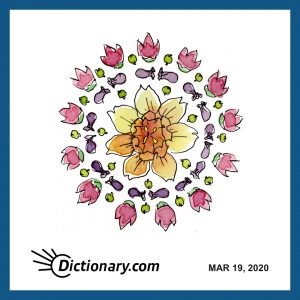Word of the Day
More about bromide
The original meaning of bromide was “a chemical compound of two elements: bromine and a second element, such as potassium or sodium.” Potassium bromide and sodium bromide are used in medicine as sedatives and anticonvulsants. The extended use of bromide, “platitude or trite saying” (from its sedative effect), was originally an Americanism, first appearing in print in the early 20th century. Bromide entered English in the first half of the 19th century.
how is bromide used?
the work is its own reward. That may sound like just another bromide, but Gilbert’s love of creativity is infectious ….
I’m intrigued by the way in which his political success … contradicts bromides about the importance, professionally, of making friends and using honey instead of vinegar.
bromide


stir-crazy
adjective
Slang.
restless or frantic because of confinement, routine, etc.: I was stir-crazy after just two months of keeping house.
More about stir-crazy
Feeling a little stir-crazy? Unpleasant though it may be, the restlessness that this familiar term calls to mind today is a far cry from the state of literal imprisonment it named upon entering English. A 1908 dictionary of unsavory terms called Criminal Slang defined stir-crazy (noun) as “a man whose mind has become affected by serving long sentences.” By the mid-1900s, stir-crazy was being used as an adjective to mean “mentally ill because of long imprisonment.” The stir in stir-crazy does not suggest movement or agitation, as one might presume based the verb stir “to move around briskly” or “to be emotionally affected”; here, stir is a slang term for prison. The origin of stir is uncertain, but some sources suggest it as a shortening of the Romani noun sturiben “prison” or verb staripen “to imprison”; others connect it to the Start, a nickname for the Newgate prison in London, which later broadened to mean prison more generally.
how is stir-crazy used?
By now, let’s hope you’re safely ensconced at home—going a little stir-crazy, perhaps, but doing your part to “flatten the curve.”
You may be trying to work from home with your stir-crazy children, and all your previous rules about screen time may need to get tossed.
stir-crazy


primaveral
adjective
of, in, or pertaining to the early springtime.
More about primaveral
The adjective primaveral is a derivative of the noun primavera “spring (the season),” found in just about all the Romance languages: Italian (end of the 12th century), Catalan (13th century), Spanish (14th century), and Portuguese (16th century); even Romanian has primăvară. The Romance forms ultimately derive from the Latin neuter plural adjective and noun phrase prīma vēra, literally “first springs.” It is common for Latin neuter plural nouns to become feminine singulars in Romance, e.g., Latin gaudia “delights, joys,” becoming singular joie in French and gioia in Italian. Primaveral entered English in the 19th century.

how is primaveral used?
Crocuses planted in clusters or in thick rows, or scattered on banks, have a brilliant effect in the sunshine of a bright primaveral day.
It is the urge of Spring—the primaveral force that inspires the young and mocks the aged.
primaveral





